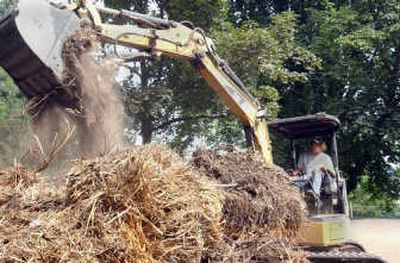Heritage Gardens need agile docents

The Moore-Turner Heritage Gardens is open to the public this weekend. It took seven years of hard work to coax this little bit of Spokane’s history out of a tangle of nearly 70 years of brush and neglect.
Now that sunlight and water are able to reach the ground again, something amazing is happening. Many of the plants that were part of the original gardens are coming back to life.
Julia Ernest, president of the Friends of the Moore-Turner Gardens, says old photos of the gardens and historical research has shown that plants like lilac, barberry and privet that were thought to have been planted by the birds are turning out to be part of the original gardens.
“The Lilac Society got in there and found that the lilacs were alternating white and purple,” says Ernest. “Birds don’t plant seeds that way.”
The rise of the Moore-Turner Gardens is a testament to the tough, resourceful people who built it and also built the civic and economic institutions and cultural traditions that make Spokane what it is today. They saw the opportunities that abounded in the region’s emerging mining, timber and agriculture industries and put Spokane on the national map. For Ernest and the dedicated group of volunteers and city staff, the garden is a window that can tell us a story as much about our future as it does the past.
To tell that story though, Ernest needs help. Help in the form of a group of volunteers, or docents, who can share the garden’s place in the region’s history.
“This project is the only one of its kind in the Northwest,” Ernest says. “Because the piece of property was given to the city directly in 1940 by the original owner and just let go.” Everything that was in the garden is still there.
What does it take to become a docent? First is a strong interest in history.
“Any place that has good docents has people who are interested in history and are willing to go out and learn more,” she says. Ernest doesn’t feel docents need to necessarily be gardeners as they can learn about the plants as they work in the garden. They need to be good storytellers to bring the garden alive and willing to help build a brand new program One caveat: Because the garden site is on a steep, rough hillside, potential docents need to be agile enough to negotiate the steep paths that wind throughout the site.
“A good pair of shoes is a must,” says Ernest.
Interested docents will train through mid-October. Volunteers also must pass a background check.